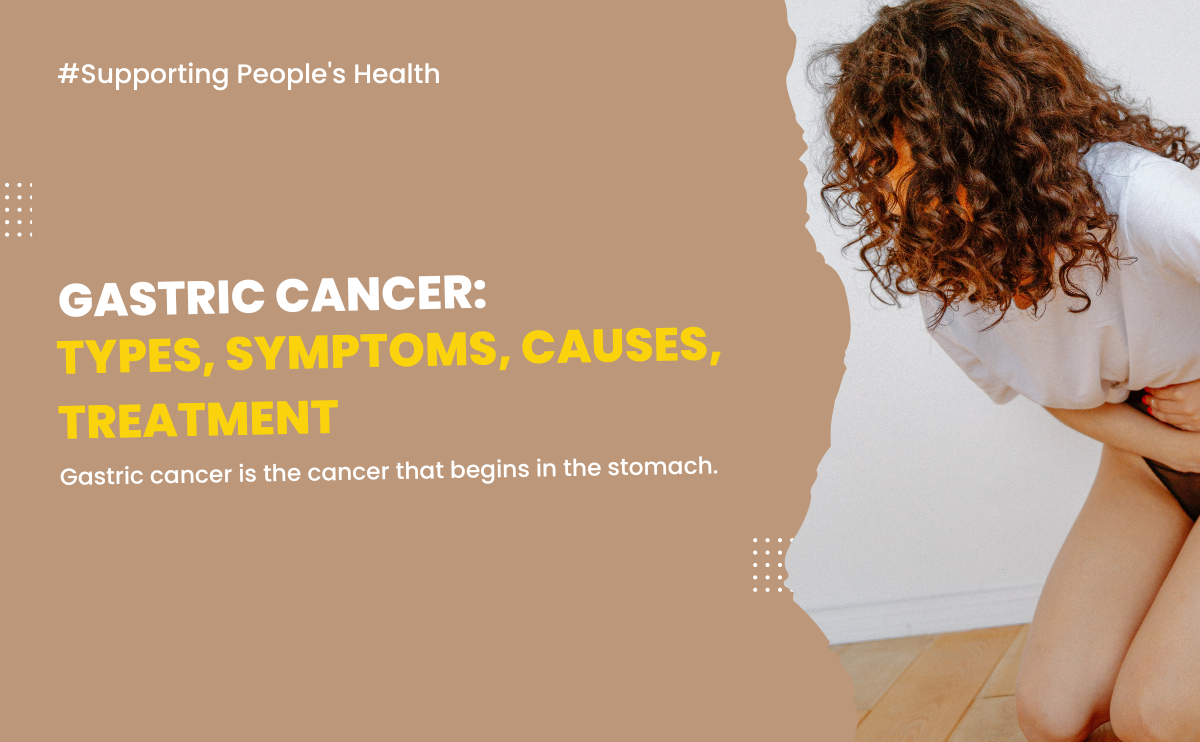Gastric cancer is the cancer that begins in the stomach.
The risk of developing this disease increases with age, with over half of those who develop it being over 75 years old. Generally, men are more likely than women to develop this type of cancer.
Types of gastric cancer
Symptoms of gastric cancer
Causes of cancer
Diagnosis of gastric cancer
Treatment of gastric cancer
Prevention of gastric cancer
According to the American Cancer Society statistics, the 5-year survival rate for gastric cancer is 70% if the disease is detected early. Learn about the symptoms, causes, and treatment methods for stomach cancer!
Types of gastric cancer
The majority of stomach cancers are adenocarcinomas. These develop in the gland cells of the inner lining of the stomach.
There are two main types of stomach adenocarcinomas, namely:
Intestinal adenocarcinoma. This type has a better prognosis as it responds better to treatment.
Diffuse adenocarcinoma. It spreads more rapidly, is more difficult to treat, but is less common than the intestinal type.
Other rare types of stomach cancer include:
Gastrointestinal stromal tumors. These occur in the Cajal interstitial cells of the stomach wall that play an essential role in the functioning of the gastrointestinal tract.
Neuroendocrine tumors. These begin in certain cells of the stomach that act as nerve or endocrine cells.
Lymphomas. These types begin in immune system cells called lymphocytes. Lymphomas usually begin in other parts of the body, but some can begin in the stomach wall.
Other types. These can be squamous cell carcinomas, small cell carcinomas, and leiomyosarcomas. They are very rare.
Symptoms of gastric cancer
The initial symptoms of gastric cancer are vague and easily confused with other less serious illnesses. These may include:
Indigestion and a burning sensation in the stomach
Feeling full and bloated after each meal
Persistent stomach pain
Dizziness and a feeling of nausea
Vomiting, with or without blood
In advanced stages of gastric cancer, symptoms may include:
Blood in stools or black stools
Loss of appetite
Weight loss
Jaundice if gastric cancer has spread to the liver
Because in the early stages, the symptoms of gastric cancer are similar to those of other conditions, the disease is often diagnosed in advanced stages. Therefore, it is important to be alert to any potential signs and to discuss with a specialist doctor to see if further medical investigations are needed.
Causes and risk factors of gastric cancer
The exact cause of gastric cancer is not fully understood, but there are certain risk factors that can favor the development of the disease. These are:
Age and sex. People over the age of 55 are at higher risk of developing gastric cancer. In addition, men are more likely than women to develop it.
Diet. Studies have shown that diet is a key factor in the development of cancer. Specifically, people who adopt a diet rich in processed foods and poor in fresh fruits and vegetables have an increased risk of developing gastric cancer.
Helicobacter pylori infection. Research has found that this bacterium can favor cancer.
Obesity. Overweight or obese people are more likely to develop upper stomach cancer.
Smoking and alcohol abuse
Family history and genetic inheritance. People with first-degree relatives with stomach cancer are more likely to develop this disease. In addition, people who are more susceptible to the disease are those who have inherited certain genetic mutations (Lynch syndrome, Li-Fraumeni syndrome, and others).
Previous stomach surgeries. Cancer is more likely to develop in people who have had surgeries to treat ulcers. The explanation is that the stomach produces less acid, which allows harmful bacteria to appear.
Diagnosis of stomach cancer
diagnosis of gastric cancer
There are several methods to diagnose gastric cancer. If the disease is identified early, there are more chances of treating it. Therefore, if you have the symptoms presented in this article, it is important to seek medical attention. The doctor may recommend the following tests:
Endoscopy. With the help of a tube attached to a video camera, the doctor can see the inside of the stomach and identify any abnormal tissue.
Blood tests. These are important to check the patient’s overall health status.
Chest X-ray and barium test. This substance helps to clearly visualize the stomach with X-rays.
CT scan (computed tomography). This is used to identify the cancerous tumor and see if it has spread to other areas of the body.
Biopsy. This procedure involves taking a small part of the tissue to be examined under a microscope. The pathologist can determine whether the tissue is cancerous or not. Biopsy can be done during endoscopy. Samples can also be taken from nearby tissues to see if cancer has spread.
MRI. With this procedure, soft tissues in the body can be seen very clearly. MRI uses radio waves and strong magnets and can be useful in certain situations, such as when you want to see the spread of gastric cancer to the liver.
Laparoscopy. This procedure can confirm whether cancer is only in the stomach or has spread. With the help of a laparoscope (a thin, flexible tube with a video camera at the end), the doctor can see the surfaces of the organs and nearby lymph nodes inside the abdomen very well. They can also remove small tissue samples to be tested for cancer. If cancer has spread, the doctor can wash the abdomen with saline (peritoneal washing). The fluid is then collected and checked for cancer cells.
Methods of treating gastric cancer
treatment of gastric cancer
The treatment of this type of cancer depends on many factors, such as:
The location and stage of cancer
The patient’s age and overall health status
The main treatments for gastric cancer are:
Surgery. Surgery can be done to remove cancer. This procedure includes partial or total removal of the stomach, as well as nearby lymph nodes and other structures (esophagus). This procedure is called a gastrectomy. If the cancer is too widespread to be completely removed, surgery can be done to prevent bleeding from the tumor or to relieve symptoms.
Chemotherapy. This uses powerful drugs to destroy cancer cells.
Targeted drug therapy. This uses drugs to find and attack cancer cells. There are several different types of targeted therapy, each targeting blocking certain receptors that help cancer cells grow and survive.
Immunotherapy. Immunotherapies are treatments that use the immune system to find and attack cancer cells.
Radiation therapy. This uses X-rays to destroy cancer cells.
There are several side effects that can occur as a result of treatment for gastric cancer.
For example, after gastrectomy, nausea, heartburn, abdominal pain, and diarrhea may occur. Some effects can be improved, but not all people. Changing the diet is important following treatment, but the doctor will recommend nutrition to the patient.



